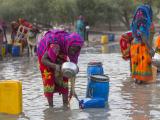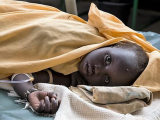Jul 22, 2011 (CIDRAP News) European Union (EU) health officials today warned travelers about a risk of contracting cholera in the Dominican Republic, a magnet for tourists, while the World Health Organization (WHO) said cholera outbreaks along Africa's Congo River have killed 271 people.
In a report released today but dated June 2011, the European Centre for Disease Prevention and Control (ECDC) said cholera is becoming endemic in the Dominican Republic. The country shares the island of Hispaniola with Haiti, which has been battling a large cholera epidemic since October 2010.
Cholera first spread from Haiti to the Dominican Republic last November, and the latter had had 5,367 suspected cases with 46 deaths by mid-June, the ECDC reported. It said 1,727 cases were confirmed.
"Despite intense efforts by the Ministries of Health in Haiti and the Dominican Republic and by humanitarian workers involved in the response to the epidemic, cholera is becoming endemic in both countries," the report says. "It is anticipated that further epidemic peaks will occur, particularly during the rainy season" (April to June and October-November).
Two European tourists, a 69-year-old English woman and a 60-year-old German woman, contracted cholera while staying at resorts in Punta Cana, Dominican Republic, in May, the report says. Theirs were the first Dominican-linked cases reported by EU member states since the epidemic began. The sources of their infections were not pinpointed and could have been either water or food.
More than a million European tourists visit the Dominican Republic annually, according to the report. It said Haiti receives far fewer European visitors, with just 23,000 in 2007.
Because of the size of the Dominican epidemic, occasional travel-related cases can be expected and may increase during the country's rainy seasons, the ECDC says. Overall, though, the risk of cholera in visitors to the country should be considered low.
The ECDC says visitors to cholera-endemic countries should drink only bottled or chlorinated water, carefully wash all fruits and vegetables with potable water, regularly wash their hands, and eat seafood only if it is thoroughly cooked. In the EU, cholera vaccination is not routinely recommended for travelers, but it might be considered for people who work in refugee camps and certain other groups.
Meanwhile, the WHO today said cholera outbreaks along the Congo River have caused more than 4,000 cases in the Democratic Republic of Congo (DRC) and the Republic of Congo.
The outbreak in the DRC was first reported in March and has intensified in the past 3 to 4 weeks, the WHO said. As of Jul 20, authorities had reported 3,896 cases and 265 deaths, with a case-fatality rate (CFR) of 7%. The affected provinces are Bandundu, Equateur, Kinshasa, and P Orientale.
In the Republic of Congo, 181 suspected cases including six deaths were reported between Jun 14 and Jul 20 in four provinces (Brazzaville, Cuvette, Likouala, and Plateaux), with a CFR of 3%, the WHO said. Four cases have been laboratory-confirmed.
"There is high risk of the epidemic further spreading along the Congo River," the agency said. "The outbreak has been reported to have spread to new locations, particularly in Kinshasa, where there are large population groups with inadequate safe water."
The governments of the two countries, along with international organizations, have set up cholera treatment centers and taken other steps to respond to the outbreaks, the WHO said. The agency said it is conducting a rapid risk assessment in the DRC to identify urgent needs and has sent four specialists to Kinshasa to support the response operations.
See also:
ECDC warning on cholera risk in the Dominican Republic
Jul 22 WHO statement on cholera along the Congo River




















